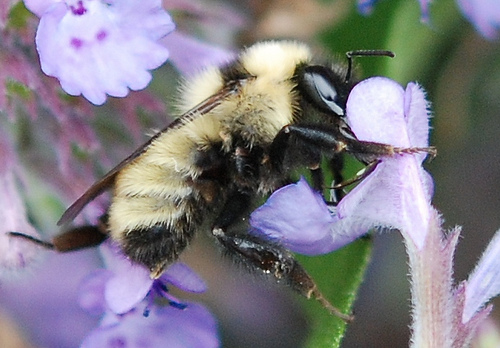Above: This is not your common bumblebee. Identified as bombus fervidus, this is among the type of bees previously thought wiped from Massachusetts landscape, until it was discovered last year at Breakneck Hill. (Photo posted to flickr by John Baker)
Town committees are continuing work to support pollinators on Breakneck Hill. And they are looking for volunteers.
Pollinators on the hill were the focus of two presentations this spring. (Click here to learn more or see the videos.)
As readers hopefully know by now, a WPI professor has been working with Town volunteers to study rare bumblebees on Breakneck Hill. The work, begun last year, is continuing this summer. To prepare, the Open Space Preservation Commission and Stewardship Committee are hosting a training session for volunteers this weekend.
The workshop is Sunday, June 26, from 10:00 am – noon at South Union School, 21 Highland Street. There will be a brief presentation on native bumblebees. Volunteers will then be trained on how to photograph bees. Finally, they’ll join Dr. Gegear in searching the hill to identify different species.
The training is for adults and older teens. Anyone with questions can email Freddie Gillespie at breakneckhillstewardship@gmail.com.
Last year, the Worcester Telegram followed Dr. Gegear to the hill and covered his findings and hopes:
With rain starting to fall Wednesday morning, Worcester Polytechnic Institute professor Robert J. Gegear was headed back to his car when a small bumblebee on a flower next to the path caught his eye.
“I found one,” he said. “Bombus fervidus.”
The mostly yellow bumblebee is a rare sight, at least in Massachusetts, and the reason Mr. Gegear, an assistant professor in the Department of Biology and Biotechnology at WPI, is conducting his research in the Breakneck Hill Conservation Area. It is so rare that the state has the species listed as extirpated in the state. The one he found was not in the best of shape stumbling around, its tongue hanging out. Speculation was it was suffering from some type of pathogen. It appeared to be on its last legs and, after a couple of failed attempts to place it on a plant, it was decided to take it back to WPI to study it.
The discovery in Southboro of fervidus and two other species of bumblebee the state has similarly listed as no longer living here, convinced Mr. Gegear it was a perfect place to study the interrelationships between pollinators and the plants they feed on. He is also is beginning to think there may be other missing species that are still here, possibly in higher elevations such as Mount Wachusett.
For the full story, click here.
Updated (6/24/16 6:06 pm): The workshop is Sunday not Saturday. Sorry.


